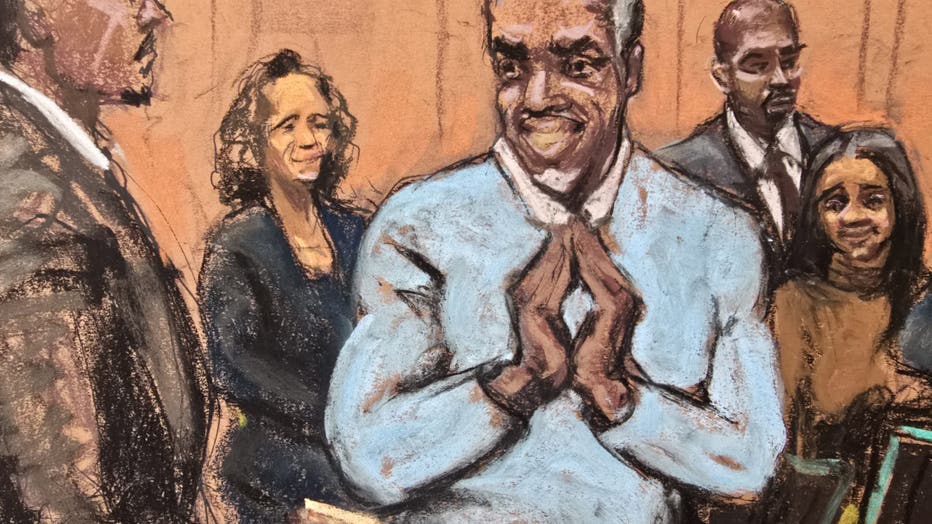Diddy trial update: Defense closing arguments filled with sarcasm in risky move

Diddy defense wrap closing arguments with sarcasm
Diddy's defense attorney used sarcasm in closing arguments to challenge the government's charges, framing the relationship with Cassie Ventura as consensual rather than sex trafficking. FOX 5 NY's Lisa Evers details the end of the Diddy trial and whether we can expect a verdict next week.
NEW YORK - In a bold move, Sean "Diddy" Combs' lead defense attorney delivered closing arguments filled with sarcasm, disputing the government's charges and portraying the relationship between Diddy and Cassie Ventura as a modern love story rather than sex trafficking.
What we know:
Six of Combs' children, along with his mother, Janice Combs, showed strong support for him in court Friday as his defense team aimed to recast the RICO sex trafficking and prostitution charges. Lead defense attorney Marc Agnifilo acknowledged Combs' abusive behavior towards Cassie Ventura but argued that she was a manipulative figure who benefited financially from their relationship. Agnifilo dismissed the notion of a racketeering conspiracy, asserting that drug purchases were for personal use and that videos were not made for extortion.
What they're saying:
Agnifilo urged the jury to see the situation differently, claiming no one was trafficked and that the women involved gained from their association with Combs. He emphasized that homemade videos were not unique to Combs, suggesting that the charges were exaggerated.
After four hours of closing arguments, Agnifilo encouraged the jury to vote not guilty, allowing Combs to return to his family.
What's next:
The judge announced that jury instructions will be provided on Monday, followed by the start of deliberations.
What did prosecutors say in closing arguments?

Prosecution delivers lengthy closing argument in Diddy RICO case
In a marathon session lasting over four hours, the prosecution presented its closing arguments in the RICO sex trafficking case against Sean "Diddy" Combs, portraying him as a criminal mastermind who used force and coercion to control his victims. FOX 5 NY's Lisa Evers details what to expect next as the trial wraps up and a verdict is on the horizon.
In the first day of closing arguments the prosecutor told jurors that Diddy "committed crime after crime" for two decades and that thought his "fame, wealth and power" put him above the law.
"It’s time to hold him accountable. It’s time for justice. It’s time to find the defendant guilty," Assistant U.S. Attorney Christy Slavik said a nearly five-hour presentation.
Diddy kept his head down as prosecutor Christy Slavik walked jurors through testimony and evidence from the seven-week trial, which she said proved sex trafficking, racketeering conspiracy, and other charges. He was seen scribbling notes to his lawyers and shaking his head.
What is the ‘proof’ in the case?
Dig deeper:
Among the evidence, prosecutor Christy Slavik argued, was proof that Diddy kidnapped an employee, took part in setting rapper Kid Cudi’s car on fire, bribed a hotel guard, and committed what she called the "brutal crimes at the heart of this case" sex trafficking.
Slavik told jurors that Diddy "again and again forced, threatened, and manipulated" his ex-girlfriends, Cassie and Jane, into having sex with escorts for his own entertainment. She delivered her closing argument from a lectern just feet from the jury box.

Prosecution and defense rest their case in Diddy trial: What's next?
FOX 5 NY's Tashanae Whitlow gives the latest update on the trial of Sean "Diddy" Combs.
Jurors were once again shown the now-infamous surveillance video of Diddy hitting, kicking, and dragging Cassie at the Intercontinental Hotel in Los Angeles in 2016, footage that opened the trial seven weeks ago. Slavik said the assault happened after Cassie tried to leave what she described as a "freak-off" involving a male sex worker.
"He knew exactly what he was doing. That is sex trafficking," Slavik said, adding that Combs was "knowingly using force and coercion to get Cassie back to that room where the escort was waiting."

Diddy's family, including several of his children, watched from the wooden benches of a packed courtroom. During a break, he turned and gave them a thumbs-up.
Since his arrest at a Manhattan hotel last September, Combs and his legal team have maintained his innocence — though they admitted during trial that incidents of domestic violence occurred.
Can the prosecution prove racketeering under RICO?

Diddy on Trial: Summary witnesses, Diddy potentially taking the stand | Street Soldiers On Location
The Sean "Diddy" Combs sex trafficking trial is revealing shocking allegations against one of the most famous men in the world. In this special episode of Street Soldiers, "Diddy Trial: On Location From Federal Court," FOX 5 NY's Lisa Evers gets into the key legal issues with federal attorney Robin Nunn, including whether or not Diddy will take the stand.
One of the five charges Diddy faces is racketeering conspiracy under the federal RICO law, which was originally created to go after organized crime.
Prosecutors must convince the jury that Diddy was not just a powerful celebrity surrounded by staff, but the leader of a criminal enterprise involved in sex trafficking, drug distribution, and other crimes over many years.
The RICO charge allows prosecutors to present a wide-ranging narrative that can include older alleged misconduct. Diddy’s lawyers argue there was no conspiracy because his employees did not agree to commit crimes. But prosecutors say members of his team repeatedly did illegal things for him, like delivering drugs, helping cover up violence, and isolating victims.
This charge could be key to tying years of allegations into a single case.

